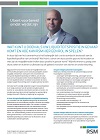In this time of the coronavirus, it is important to pay extra attention to your company’s liquidity position. What can you do to maintain a healthy liquidity position and what options do you have if this position is compromised? We would like to inform you about these matters and can provide you with relevant advice and support, of course.
Enclosed is a brief note on what you can do to minimise the financial impact of the measures as a result of the coronavirus. Proper liquidity planning is essential of course, which can be used to determine how much liquidity is needed to cover any liquidity shortfall and when any requested additional financing can be repaid. The bank always asks three questions: how much liquidity is needed, when can it be repaid and can additional collateral be provided. In principal, the application for credit must be submitted to the current financier.
RSM can assist you with the following:
Providing an overview of the liquidity position and liquidity planning
Drawing up a liquidity budget, possibly based on different scenarios, showing the current liquidity needs. The scenarios may vary depending on, for example, the duration and intensity of the corona measures. This liquidity budget is on a monthly basis and includes the profit and loss account, balance sheet and cash flow for at least a best-case and worst-case scenario. The liquidity planning can be used for both financiers and stakeholders.
Identifying appropriate measures
RSM can assist and advise you on appropriate measures, including:
- Application of temporary arrangement for compensation of labor costs, applications for tax deferrals, applications for deferral of rent payment obligations, and provisional assessments and applications for an expansion of the guarantee scheme for loans to the SME sector (BMKB);
- optimising working capital (inventory optimisation, accelerated collection of accounts receivable, invoicing work in progress);
- negotiating with financiers and other creditors and providing support in drawing up new financing documentation including financing covenants;
- postponing replacement or expansion investments and divestment of business units;
- preparing a risk analysis including mitigating measures.
Analysing the effects of measures to be implemented
RSM can assess the impact the appropriate measures listed above may have on your business. This allows us to determine together with you whether the measures implemented are adequate and whether additional measures are required.
Which schemes currently in place at the banks do companies qualify for?
Stretching current financing
Discuss with the bank whether it is permitted to temporarily stop making repayments/interest payments. One solution could be to extend the term by one year. However, in that case the bank must be confident that any deferment would not result in default, so the company must be considered healthy under normal circumstances, despite the coronavirus effects.
Increasing current financing
Make full use of the financing capacity available to the company. In other words, maximum overdraft. The company often has a bank overdraft, but has not exhausted the capacity. Instruments are available to generate cash in the short term. The following instruments can be used for this:
- sale lease back: sell the property on the balance sheet to the investor, this generates cash and the property can then be leased.
- factoring: an entrepreneur transfers his invoicing and bad debt risk to a company specialising in this, the factoring company. In exchange for paying this company a fee, the entrepreneur immediately receives the funds he is owed.
- taking out or increasing a mortgage for any immovable property owned by the company/undertaking.
The government offers two schemes where the government is the guarantor, thus reducing the credit risk of banks.
The first scheme is the SMEs Credit Guarantee Scheme (BMKB). The BMKB is particularly attractive for companies that have insufficient collateral. The government has made extra credit available, which the banks may claim. Companies may use this as a bridging loan or to increase their bank overdraft, i.e. the amount they are allowed to “be in the red”. For this, entrepreneurs can apply to lenders. Under the regular scheme, the state-guaranteed loan concerns 50% of the credit provided by the financier, often a bank. The new measure increases the share of the state-guaranteed loan in the BMKB from 50% to 75%. This allows banks to extend credit more easily and quickly and gives companies the opportunity to borrow more money sooner. In addition, the maximum amount of the BMKB credit has been temporarily increased from € 1 million to € 1.5 million. The BMKB is intended for companies with up to 250 employees (FTEs) with an annual turnover of up to € 50 million or a maximum balance sheet total of € 43 million. More information.
The second scheme is the GO scheme: The GO scheme is geared towards companies with substantial operations in the Netherlands and with satisfactory prospects of profitability and continuity. A minimum of €1.5 million and a maximum of €50 million in loans and/or bank guarantee facilities may be outstanding per company under the GO scheme. The guarantee percentage is 50 percent. Therefore, the maximum amount guaranteed is €25 million. This is borne by the government and banks on a 50/50 basis. There are currently indications that this GO scheme will also be expanded.
Obviously, we will keep you informed of any new developments.
If you have any questions about the corona measures and your financial position, please contact one of our RSM colleagues. We have set up a crisis team that can provide you with the right answer as quickly as possible. If more related information becomes available or if there is a change in the measures implemented, we will obviously inform you accordingly.
Download 'What options do companies have if their liquidity position is at risk and how can RSM assist?' in pdf

